Each year the International Telecommunications Union puts out statistics on the state of mobile and internet data around the world. What I’m interested in is their “Information Society Statistical Profiles 2009 – Africa” report, put out just this week. Here are some key takeaways, but you should really go download the full report for yourself.
A decade of ICT penetration in Africa
“By the end of 2008, Africa had 246 million mobile subscriptions and mobile penetration has risen from just five per cent in 2003 to well over 30 per cent today. The high ratio of mobile cellular subscriptions to fixed telephone lines and the high mobile cellular growth rate suggest that Africa has taken the lead in the shift from fixed to mobile telephony, a trend that can be observed worldwide. The number of Internet users has also grown faster than in other regions.”
Despite this growth rate, penetration is far below the rest of the world. As the report states, “Less than 5% of Africans use the Internet, and fixed and mobile broadband penetration levels are negligible.” The global average is 23% internet penetration. This is due mainly to cost, but also to coverage over a very large continent that lacks population density outside of major cities.
Not all of Africa is created equal
If you’re a company trying to make money off of providing services or products to mobile phone users in Africa, you have to think strategically. You can see from the chart below that the countries you should focus on first are Nigeria, South Africa, Kenya, Ghana, Tanzania and Côte d’Ivoire.
This holds true for the internet as well. You’ll note that many of the top countries for mobile penetration are also countries with a strong internet growth rate.
“According to a recent household survey conducted by Research ICT Africa, the main location of Internet use in such countries as Benin, Burkina Faso, Cameroon, Côte d’Ivoire, Ethiopia, Ghana, Kenya, Nigeria, Rwanda, Senegal, Tanzania and Zambia is the cyber/Internet café.”
Leapfrogging… with a catch
Many reports you read will sing the praises of the mobile networks and how the leapfrogging of landlines has helped Africa. That’s true, and I’m one of those people. However, it comes with a catch, and that catch is that the lack of landlines in Africa means that it’s a lot harder to get fixed-line broadband penetration, whether ADSL or otherwise. This keeps prices high and primarily availability is only in urban areas.
This gives the mobile operators a significant advantage in Africa, and it’s the reason why 3G (mobile broadband) technology is leading the way and why most of the growth will be through the mobile networks.
To put it in real numbers. By the end of 2008 there were only 635,000 fixed-line broadband subscribers in all of Africa, representing 0.1% of the population, whereas the world average is 6%. Mobile broadband sees 7 million subscribers with a penetration representing 0.9% of the population, again 6% being the global average.
In Summary
This report is an absolute gold mine of valuable data on internet and mobile phone usage, penetration and growth rates in Africa. I could go on with more graphs and thoughts on each section, but you should do yourself a favor and download the free copy and read it.
Finally, some last charts showing mobile cellular subscriptions, mobile broadband and internet subscriptions by country in Africa:
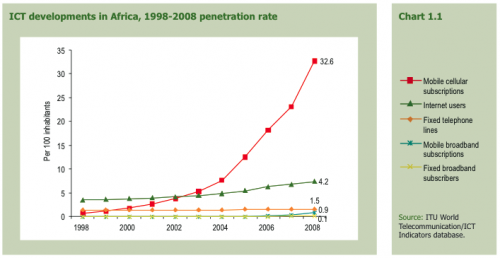
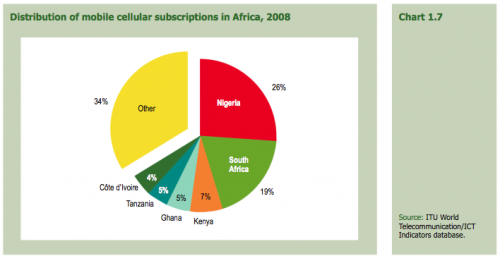
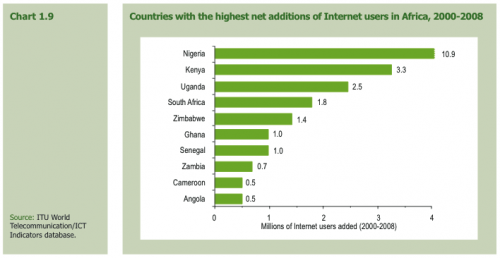
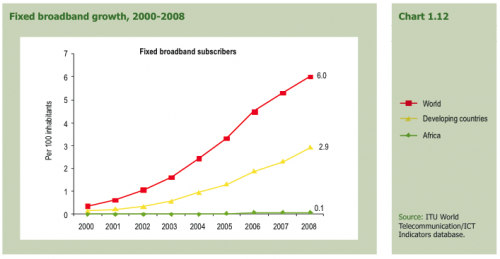
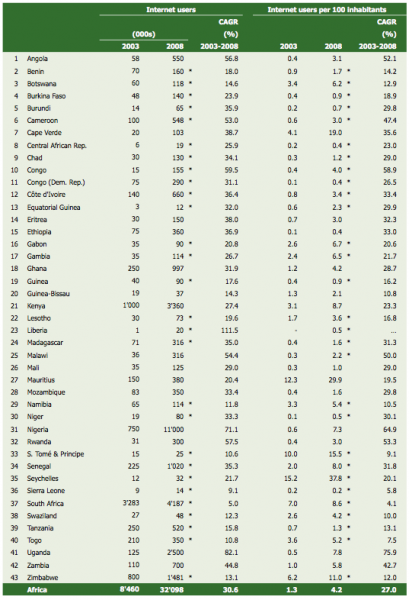
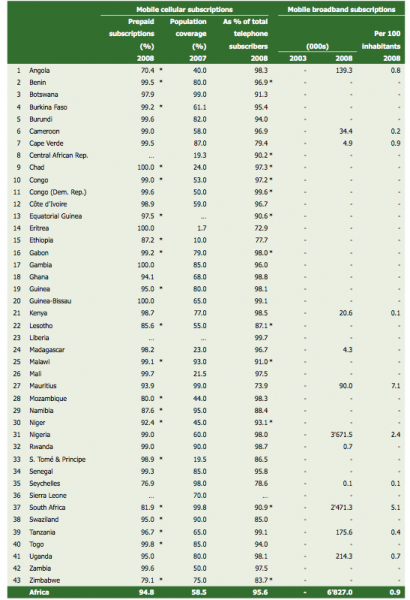
December 22, 2009 at 10:10 pm
Well, I think that it’s actually the case that the growth is more due to folks having multiple phones with multiple carriers that real penetration and we’ll see something of a leveling off over the next year. I wrote a bit about that as well as other things since I find the constant attention solely on Africa’s mobile growth to be ignoring the other elephants in the room. That being said, I’m glad you’ve pointed out some of the other sides to the constant attention given only to these stats.
December 23, 2009 at 3:14 am
Thanks for this great link.
Africa is so far behind in ICT infrastructure that growth statistics are really just feel-good numbers. Highly useful for sure, particularly for calculating trends, but its revelancy becomes clearer when you drill down into specifics of an individual country’s infra. We’re going to see such headlines for years to come, but growth stats sadly translate into Africa playing catch-up with the rest of the world.
December 23, 2009 at 5:06 am
Valuable information Hash. Thanks for posting it.
December 23, 2009 at 5:41 am
Africa’s main problem is that it is generally sparsely populated and a good number of those populations barely have the resources to acquire these technologies. Unless African governments integrate ICT’s firmly into their social policies as is the case in Kenya and Rwanda it remains to be seen whether this growth will have an impact on the masses in a way that would be helpful.
Nevertheless we should continue to celebrate these statistics.
See this extensive article on Kenya’s Mobile Revolution
http://johnkaranja.com/2009/07/12/what-next-after-the-mobile-revolution-in-kenya/
December 23, 2009 at 6:48 am
Very good news for Web and Mobile Technology developers in Africa.
December 23, 2009 at 4:05 pm
Thanks for sharing this, Erik!
December 23, 2009 at 5:15 pm
Thanks for this excellent piece on Mobile in Africa.
My suspicion (hope) is that many innovative business models will piggy-back on the back of mobile adoption in Africa
December 24, 2009 at 9:57 am
Thanks for sharing this valuable information.
December 24, 2009 at 1:38 pm
Thanks for this. Excellent review on the web and mobile space in Africa.
December 29, 2009 at 11:53 am
What will be interesting is the entry/buyouts of mobile networks as the global payers start tatking this markets seriously. The number of mobile device/phone makers setting up company offices in Africa is increasing. The World Cup will also be a factor. 2010 is going to be good – again.
December 29, 2009 at 1:25 pm
Interesting to see these updated statistics. It is also interesting the way Nigeria stands out in terms of the sheer numbers. The per capita indicators aside, The statistics should point at the need to more seriously pursue regional economic integration initiatives such as the East African Community, SADC etc. That should make increasing business sense for investors in the industry.
February 15, 2010 at 3:31 pm
This is a very interesting statistics. Nigerians are really dominating the internet in Africa
March 26, 2010 at 7:30 am
Yes Nigeria is dominating but I still believe we have to do more, Nigeria has all it takes to position herself in Africa, just the way America has positioned herself in the the world
May 3, 2012 at 4:30 pm
Are we really growing or are all this a mirage?